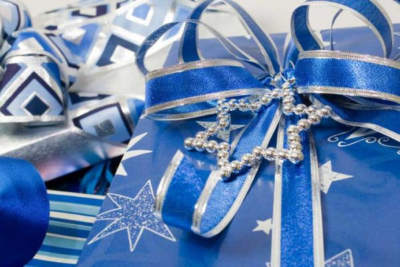Gift-giving on Chanukah is so popular a custom that we rarely stop to think about it. Why do we do it? Are we just copying Christmas, or is there some Jewish tradition present in the act of gift-giving? (No pun intended.) To find out how gift-giving became such a prominent aspect of Chanukah, we have to dig deeper to the core of what the holiday is about.
Yet other sources offer a different perspective regarding how the tradition started. Before presents and gifts, Jewish communities usually gave each other money on Chanukah. Writer Natasha Rosenstock explains on that giving gelt (the Yiddish word for money) on Chanukah may stem from how the ancient Jews made their own coins as a symbol of their independence after winning the battle against the Greeks.
In fact, many families in Europe gave each other money both to commemorate this aspect of the Chanukah story and to celebrate a lesser known focus of Chanukah, education. The shoresh, or root word, of Chanukah is the same as the Hebrew word chinuch, which means “to mold” or “to educate.”
Because of this connection, in the past, many students gave their religion teachers money on Chanukah as a way of showing gratitude for their education, since normally teachers of Torah would not accept payment for their teaching. So, giving money is actually a remnant of a past custom, one that links to a less commonly known core theme of Chanukah.
But when did giving money turn into giving presents? Dianne C. Ashton, Director of American Studies at Rowan University, says, during the 1950’s, Jewish child psychologists started promoting the idea of gift-giving as a way to help post-Holocaust children feel more excited about the holiday and more comfortable with being Jewish in America.
The other likely explanation is we’ve simply allowed Christmas to influence how we celebrate Chanukah. In the late nineteenth century, Christmas started to become a much more commercialized holiday, and Jewish families wanted to jump on that bandwagon, as well. American Jews used to reserve gifts for Purim, mishloach manot, but once their Christian neighbors started giving gifts around Christmas time, Jews chose to give on Chanukah also as a way of keeping up with the times.
It’s unclear whether gift-giving is an example of strengthening pre-existing Jewish traditions or assimilating to a majority Christian society. Either way, we can make the practice of giving gifts reflect Jewish values. Maybe fry latkes for your dorm neighbor or buy a new menorah for a friend who may not light candles every year. This way we can balance new traditions with old customs and bring all aspects of Chanukah to light.
Elizabeth Zakaim is currently a sophomore at The College of New Jersey, double majoring in psychology and journalism. For comments or questions, feel free to email her at zakaime1@tcnj.edu.
![11078045764_a742918ed8_z Is gift-giving a Jewish tradition? | By kras2fr [CC BY 2.0], via Creative Commons](https://newvoices.org/wp-content/uploads/2016/12/11078045764_a742918ed8_z.jpg)

